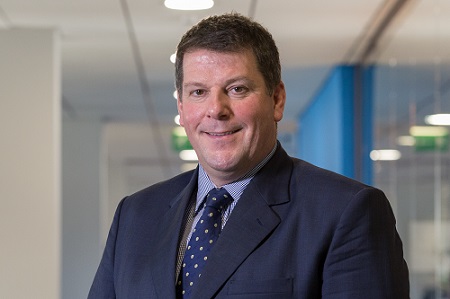ICAS slams Scottish Budget as ‘short-sighted’

Bruce Cartwright
The Institute of Chartered Accountants of Scotland (ICAS) has expressed significant concerns about the latest Scottish Budget, labelling it as “short-sighted” and ineffective in fostering long-term economic growth.
Bruce Cartwright CA, Chief Executive at ICAS, said: “The Scottish government’s budget is both short sighted and fails to drive sustained economic growth. We continue to call
for a five-year roadmap for growing the economy which would also give Scottish businesses some reassurance and stability – something we know they want to see.”
“ICAS has been advocating for a long-term business plan for Scotland for a considerable time and we were dismayed to see that we have another year of only planning one year ahead. The Scottish Fiscal Commission produced a set of five-year forecasts on 25 May 2023 and the Scottish Government could have used this information to outline a five-year roadmap to sit alongside them.”
Scottish income tax rates and bands
Justine Riccomini, Head of Tax (Employment and Devolved Taxes) at ICAS said: “Implementing further tax increases on higher earners is not a long-term sustainable solution and will have a negative impact on positioning Scotland as an attractive place to live and do business. Scotland already has five of the highest tax bands in the UK, and these changes will impact the growth of the Scottish economy, while only covering 5.4% of the budget deficit.
“Additional tax bands introduce more complexity into an already overcomplicated tax system. We have called for tax simplification for many years to make it easier for taxpayers
to understand and engage with the system. A complex tax system drives up costs for both taxpayers and businesses, and we urge devolved governments to work closely with the UK government when designing devolved or new taxes to make sure that tax is kept as streamlined and simple as possible.
Chris Campbell, Head of Tax (Tax Practice and Owner Managed Business Taxes) at ICAS, said: “Today’s budget announcement reveals that anyone earning more than
£28,867 will pay more income tax then their UK counterparts. Aside from the new advanced tax rate and the increase in the additional rate, today’s announcement has also not improved the tax burden on so-called ‘middle earners’. The freezing of income tax thresholds at the Higher Rate and above will result in more employees being brought into those tax bands when they receive pay rises. After last month’s Autumn Statement, employees living in Scotland earning between £43,663 and £50,270 will still be asked to pay an effective tax rate of 52%, including national insurance. This is 22% higher than employees living elsewhere in the UK on equivalent salaries.
“Those in the new advanced rate band and earning over £100,000 will have an effective marginal rate of tax, including national insurance, of 70%. It’s possible that individuals in this position with multiple job offers who may be deciding on where to locate in the UK will take account of the new tax rates before making a final decision on where to be based.”
Justine Riccomini, Head of Tax (Employment and Devolved Taxes) at ICAS said: “We believe in the need to expand the tax base in Scotland, so that income tax revenues
are sustainable to fund public services. The Scottish government has stated that the new tax rates will mean that 58% of taxpayers will pay less than they would if they lived in the rest of the UK. This means there is continuing reliance on a minority of taxpayers earning above £28,887 to pay for public services in Scotland. There is a need for a longer-term strategy to grow the economy, moving employees out of lower paid jobs and reducing the inactive working population.”
Chris Campbell, Head of Tax (Tax Practice and Owner Managed Business Taxes) at ICAS, said: “Those who operate unincorporated businesses in Scotland and are affected by the changes in tax rates may also decide to re-evaluate whether they should operate as a company. Where a business becomes a limited company, this is likely to lead to less tax revenue for the Scottish government, as corporation tax is paid to the UK government. The Scottish government may have to rely on tax receipts based on profits extracted from a company, where the tax changes have resulted in a business changing its status.”
Scotland for business
Chris Campbell, Head of Tax (Tax Practice and Owner Managed Business Taxes) at ICAS, said: “We’re disappointed to note that no announcements have been made in relation to extensions to the tax reliefs for a further five years in the two Scottish Green Freeports, which was announced in the UK Autumn Statement in relation to English Freeports. If the Scottish government had opted to replicate the tax reliefs currently in place across the rest of the UK, the potential for growth would have been significantly higher.
“While many businesses will welcome the freeze in the non-domestic rate poundage and the retention of the small business bonus rates relief, there will be many more businesses who will be disappointed. Although there was limited relief for hospitality businesses in the Islands, we feel certain that we will see representations being made by those in the beleaguered hospitality and retail sectors in the coming days in relation to the failure to address business rate reductions which businesses south of the border currently benefit from. More could have been done to assist the sector.”
VAT and air departure tax
On the devolution of air departure tax, Justine Riccomini, Head of Tax (Employment and Devolved Taxes) at ICAS said: “It’s unfortunate that the Deputy First Minister didn’t indicate any movement on the devolved tax powers in relation to VAT and air departure tax in her statement. Both powers have now been available to the Scottish government for several years, but issues surrounding their introduction remain unresolved. We would like to see a clear path set out for both measures to provide businesses with certainty.
“In collaboration with the Chartered Institute of Taxation (CIOT), we recently published ‘Building a better tax system: Progress report’, calling on the Scottish government to use the tenth anniversary of the Smith Commission next year to review the implementation of Scotland’s devolved tax powers. ICAS would like to see more attention being paid to the devolved powers it already has.”
Land and buildings transaction tax (LBTT)
Chris Campbell, Head of Tax (Tax Practice and Owner Managed Business Taxes) at ICAS, said: “Today’s Scottish Budget made no changes to the rates of LBTT or the additional dwelling supplement (ADS). ADS rates increased to 6% in last year’s Scottish Budget, so it was unlikely that there would be further changes this time.
“While there were no changes in LBTT and ADS, the Scottish Budget missed the opportunity to correct anomalies in comparison to the rest of the UK. Where someone buys residential property in Scotland, and either hold another property or have not sold their old house, they only have 18 months to reclaim the tax from Revenue Scotland, compared with three years for stamp duty land tax in the rest of the UK. Further anomalies remain in respect of separating couples.”







